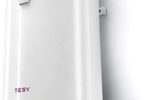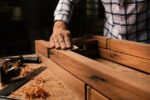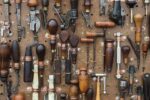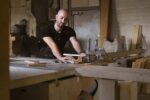Ryobi Brushless vs Brushed | Which is Better? | 2023
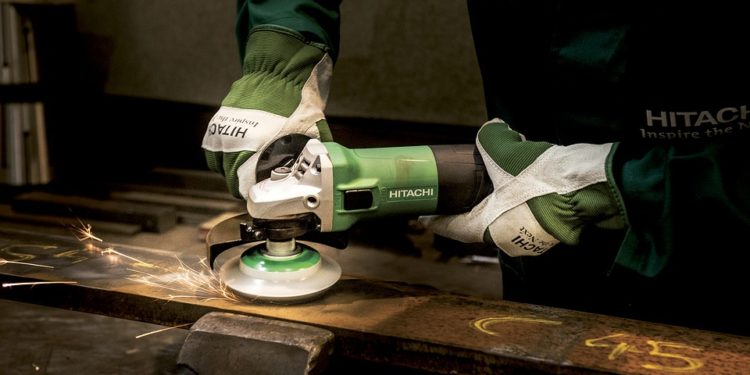
If you are considering purchasing some new power tools, you will no doubt find yourself weighing up the pros and cons of brushless and brushed motors. While brushed power tool motors were once the standard and continue to be a popular option, they are fast being pushed out of the market in favour of brushless alternatives.
More established power tool brands tend to have an even weighting of brushless and brushed power tools, but newer brands have a tendency to offer a larger range of brushless options. One of these manufacturers is Ryobi, a fairly new name on the scene. Need some help deciding whether a brushless motor upgrade is worth the additional expense? Read on for a useful guide on the main differences between brushed and brushless power tool motors.
Brushed Motors Explained
Brushed motors are the more basic option for power tools. Most brushed motors are made up several key components, including brushes, a commutator, rotor, axel and field magnet. Brushed motors will also need some type of power supply. Although brushed motors have been used in the power tool market for many years, they are not without their issues. Standard brushed motors tend to be on the heavy side, which results in tools that are bulky and awkward to handle.
They are generally not a good fit with cordless power tools. Brushed motors are also prone to overheating. Because of the brushes used in their design, they can easily produce sparks when in operation. When a motor generates excessive heat and sparks,, this results in loss of energy. If you are using a cordless power tool with a brushed motor, this will severely diminish battery levels. This means you will have to constantly reconnect batteries to power supplies in order to keep them charged and operational.
The brushes used within these types of motors will also become damaged over time. Because they constantly undergo significant wear and tear, you will ultimately need to replace them. This means brushed motors come with an additional maintenance cost that needs to be factored in when deciding on an initial purchase. You also have to be confident that you can actually replace brushes without causing any unnecessary damage to your motor or power tool mechanics.
Brushless Motors Explained
Although some people consider brushless motors cutting-edge power tool technology, they have actually been around in one form or another for many decades. In fact, the first brushless motors were put to use in the 1960s. However, they have become far more commonplace and much more affordable in recent years, hence why you will plenty of power tools making use of them. Nowadays, pretty much every main type of power tool can incorporate the functionality of a brushless motor. This is includes all of the main power tool product categories offered by brands like Ryobi.
Brushless motors are far more economical and efficient than brushed varieties. For a start, a brushless motor has less moving parts overall. Brushless motors also generate less heat when in use, meaning you do not have to worry about the same overheating issues that plague brushed motors. They are also more energy-efficient, resulting in less of a drain on batteries. This makes them well suited to cordless power tools.
While a standard brushed motor uses carbon brushes and a variety of other components to power your tools, a brushless motor strips things down to a bare minimum. The majority of brushless motors only use magnetic elements and minimal circuitry in order to provide your power tool batteries with energy. Brushless motors are far more efficient than brushed one. The innovative circuitry means just the right amount of energy is utilised to drive your motor, meaning there is next to no waste. After a full charge, power tools with brushless motors can usually run for a third longer than tools with brushed motors.
Because they have less moving parts, brushless motors also tend to be more durable than their brushed counterparts. You do not have to worry too much about an unexpected impact damaging your power tool. Brushless motors also tend to be slightly larger than brushed motors, further adding to their durability and general robustness. Despite being somewhat larger than brushed motors, power tools that utilise brushless motors are fairly lightweight. This makes them perfect for use with cordless power tools.
Ryobi Power Tool Motors
Most of the power tool product range from Ryobi offers you a choice of brushed and brushless motors. Below, we break down some of the main power tool categories so you can have a clearer idea of when a brushless motor is called for.
Impact Drivers
Impact drivers are the kind of power tool that is used on a frequent basis. If you have need for an impact driver, you will be reaching for it constantly. This kind of power tool is needed when you need to drive large screws into tough materials, or when you need to tighten metallic fasteners into place. They can also be used to drill bit holes into some materials when used with the right bit attachments. A brushless motor makes an impact driver far more efficient and better suited to these applications. You can comfortably use your impact driver for lengthy periods of time, without worrying about overheating or sparks being generated as you work.
You also do not have to worry about the battery draining down to unusable levels. Impact drivers that use brushless motors tend to be fairly compact, with little difference in size to those that use brushed motors. You will probably be working tight spaces when handling an impact driver, so this compactness is very welcome. You are also free to work for longer with an impact driver with a brushless motor. Depending on the exact tasks you are undertaking, the battery of a brushless impact driver will provide you with hours of operational time before needing to be recharged.
If you are looking to purchase a reliable impact driver that performs efficiently, Ryobi has some quality options for you to mull over. The Ryobi R18IDBL 18V ONE+ is a particularly good choice. This compact impact driver not only provides you with the frictionless performance of a brushless motor, but also boasts smart electronics to ensure your battery is utilised effectively at all times. The R18IDBL is also a reasonably affordable impact driver and is compatible with Ryobi’s interchangeable battery system.
Rotary Hammer Drills
Heavy-duty power tools significantly benefit from brushless motors. A tool like a rotary hammer drill relies heavily on motor efficiency to ensure it provides you with the impact energy you need consistently. The main advantage of a brushless rotary hammer drill is that you can run in at max impact output or long periods, without the worry of sparks and overheating. The best rotary hammer drills draw other benefits from other brushless motors, with the innovative motor design also helping minimise vibration when working.
Ryobi has a good choice of power tools in this category. The Ryobi R18SDS-0 18 ONE+ SDS+ is a reliable choice of rotary hammer drill that makes good use of its brushless motor. This heavy-hitting power tool not only provides you with incredible impact energy for easy drilling into tough materials, but also provides you with additional chisel functionality for lighter applications.
Angle Grinders
Any good angle grinder will require substantial amounts of power in order to operate effectively. In fact, a proficient angle grinder has similar power demands to a rotary hammer drill. If you want to use angle grinders to cut through tough materials and heavy masonry, a brushless motor is essential. A brushless motor will not only ensure your angle grinder does not overheat, it also regulates battery usage effectively. An angle grinder with a brushless motor will never draw more battery power than is required, meaning you can enjoy longer runtime after a full charge.
The Ryobi R18AG7-O 18V angle grinder is a great power tool product that massively benefits from its brushless motor. This efficient motor makes it an ideal choice for a wide variety of grinding applications and cutting tasks, with the brushless motor deign meaning you do not have to contend with frictional resistance when working. The brushless motor also deploys smart electronics to regulate performance, while also extending overall runtime.
Brushed or Brushless?
Although some people still prefer corded power tool options and brushed motors, it makes sense to consider upgrading to brushless motors. The best brushless motors will perform just as well as a brushed motor with a corded power supply. In fact, many power tools with brushless motors can outperform conventional varieties.
Ryobi is worth looking into if you are thinking about switching from brushed motors to brushless ones. All of their main product categories offer brushless motor options, providing you with compact tool builds and lightweight convenience for effortless handling. Ryobi power tools with brushless motors also run efficiently for longer periods, remaining cool and free of sparks. Ryobi’s interchangeable ONE+ battery system makes their range of brushless power tools even more enticing.

